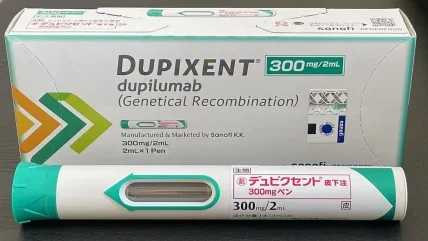
The US Food and Drug Administration (FDA) has accepted the resubmission of the supplemental biologics licence application (sBLA) for Sanofi and Regeneron’s Dupixent (dupilumab) for the treatment of chronic spontaneous urticaria (CSU).
The application seeks approval for use in adults and paediatric patients aged 12 years and older whose condition remains inadequately controlled by H1 antihistamines. The FDA has set a target action date of 18 April 2025 for its decision.
Dupixent, a fully human monoclonal antibody, is being jointly developed by Sanofi and Regeneron under a global collaboration agreement. The therapy works by inhibiting the IL-4 and IL-13 pathways, key drivers of type-2 inflammation, and is not classified as an immunosuppressant.
The resubmitted application is underpinned by findings from the LIBERTY-CUPID Phase 3 clinical programme, which includes Studies A, B, and C. The updated sBLA incorporates results from Study C, which involved patients with CSU uncontrolled by standard-of-care antihistamines.
This pivotal study met both its primary and key secondary endpoints, confirming earlier results from Study A. The data showed that Dupixent significantly reduced itch and urticaria activity, including hives.
Safety outcomes across all three studies were consistent with the therapy’s established safety profile. The most common adverse events observed with Dupixent, compared to placebo, were injection site reactions and COVID-19 infections.
Studies A and C focused on CSU patients uncontrolled by antihistamines, while Study B involved patients whose condition was refractory or intolerant to omalizumab. The programme builds on previous findings that demonstrate the clinical benefit of Dupixent in reducing type-2 inflammation, a central mechanism in multiple inflammatory and often co-morbid diseases.
Dupixent has already been approved for the treatment of CSU in Japan and the UAE, and it is under regulatory review in the European Union. However, its safety and efficacy for CSU outside these regions remain under evaluation.
The therapy has received regulatory approval in over 60 countries for various indications, including atopic dermatitis, asthma, chronic rhinosinusitis with nasal polyps, eosinophilic oesophagitis, and prurigo nodularis.
Separately, the European Medicines Agency (EMA) recently approved Dupixent for treating eosinophilic oesophagitis in children aged one to 11 years who weigh at least 15kg. This represents the first treatment approval for this condition in young children within the EU. The EMA’s decision applies to patients who are inadequately managed by, intolerant to, or unsuitable for existing therapies.






